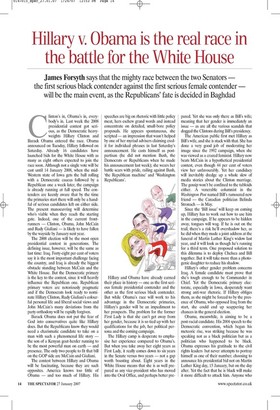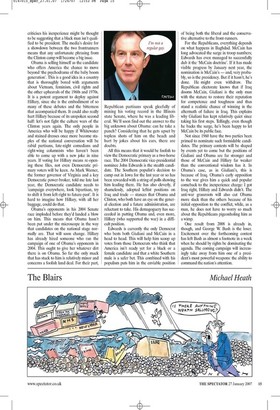Hillary v. Obama is the real race in the battle for the White House
James Forsyth says that the mighty race between the two Senators — the first serious black contender against the first serious female contender — will be the main event, as the Republicans' fate is decided in Baghdad Clinton's in, Obama's in, everybody's in. Last week the 2008 presidential contest got serious, as the Democratic heavyweights Hillary Clinton and Barack Obama entered the race. Obama announced on Tuesday, Hillary followed on Saturday. Already 16 candidates have launched bids for the White House with as many as eight others expected to join the race soon. Although not a single vote will be cast until 14 January 2008, when the midWestern state of Iowa gets the ball rolling with a Democratic caucus followed by a Republican one a week later, the campaign is already running at full speed. The contenders are keenly aware that by the time the primaries start there will only be a handful of serious candidates left on either side. The present manoeuvring will determine who's viable when they reach the starting gate. Indeed, one of the current frontrunners — Clinton, Obama, John McCain and Rudy Giuliani — is likely to have fallen by the wayside by January next year.
The 2008 election will be the most open presidential contest in generations. The defining issue, however, will be the same as last time: Iraq. Forty-eight per cent of voters say it is the most important challenge facing the country, and Iraq is already the biggest obstacle standing between McCain and the White House. But the Democratic primary is the key to the contest, since it will heavily influence the Republican one. Republican primary voters are notoriously pragmatic and if the Democrats look ready to nominate Hillary Clinton, Rudy Giuliani's colourful personal life and liberal social views and John McCain's many deviations from the party orthodoxy will be rapidly forgiven.
Barack Obama does not put the fear of God into conservatives quite like Hillary does. But the Republicans know they would need a charismatic candidate to take on a man with such a phenomenal life story — the son of a Kenyan goat-herder running to be the most powerful man on earth — and presence. The only two people to fit that bill on the GOP side are McCain and Giuliani.
The contest between Hillary and Obama will be fascinating, because they are such opposites. America knows too little of Obama — and too much of Hillary. His speeches are big on rhetoric with little policy meat, hers eschew grand words and instead concentrate on detailed, small-bore policy proposals. He appears spontaneous, she scripted — an impression that wasn't helped by one of her myriad advisers claiming credit for individual phrases in last Saturday's announcement. He casts himself as postpartisan (he did not mention Bush, the Democrats or Republicans when he made his announcement last week); she wears her battle scars with pride, railing against Bush, `the Republican machine' and 'Washington Republicans'.
Hillary and Obama have already earned their place in history — one as the first serious female presidential contender and the other as the first serious black contender. But while Obama's race will work to his advantage in the Democratic primaries, Hillary's gender will be an impediment to her prospects. The problem for the former First Lady is that she can't get away from her gender, because it is so tied up with her qualifications for the job, her political persona and the coming campaign.
The Hillary camp is desperate to emphasise her experience compared to Obama's. But when you take away her eight years as First Lady, it really comes down to six years in the Senate versus two years — not a gap worth boasting about. Eight years in the White House means that she is as well prepared as any vice-president who has moved into the Oval Office, and perhaps better prepared. Yet she was only there as Bill's wife; meaning that her gender is immediately an issue — as are all the various scandals that dogged the Clintons during Bill's presidency.
The American public first met Hillary as Bill's wife, and she is stuck with that. She has done a very good job of moderating her image since the 1992 campaign, when she was viewed as a crazed feminist Hillary now beats McCain in a hypothetical presidential contest, even though 44 per cent of voters view her unfavourably. Yet her candidacy will inevitably dredge up a whole slew of media stories about the Clinton marriage. The gossip won't be confined to the tabloids either. A venerable columnist in the Washington Post named Bill's rumoured new friend — the Canadian politician Belinda Stronach — in May.
Since the 'Bill issue' will keep on coming up, Hillary has to work out how to use him in the campaign. If he appears to be hidden away, tongues will wag. If he is out on the trail, there's a risk he'll overshadow her, as he did when they made a joint address at the funeral of Martin Luther King's widow last year, and it will look as though he's running for a third term. One proposed solution to this dilemma is to deploy Chelsea and Bill together. But it will take more than a photogenic daughter to reduce his shadow.
Hillary's other gender problem concerns Iraq. A female candidate must prove that she's tough enough to be Commander in Chief. Yet the Democratic primary electorate, especially in Iowa, desperately want strong anti-war rhetoric. If Hillary obliges them, as she might be forced to by the presence of Obama, who opposed Iraq from the start, she could end up scuppering her chances in the general election.
Obama, meanwhile, is aiming to be a post-racial candidate. His 2004 speech to the Democratic convention, which began his meteoric rise, was striking because he was speaking not as a black politician but as a politician who happened to be black. Obama expresses his gratitude to the civil rights leaders but never attempts to portray himself as one of their number; choosing to announce his presidential bid not on Martin Luther King day, 15 January, but on the day after. Yet the fact that he is black will make it more difficult to attack him Anyone who criticises his inexperience might be thought to be suggesting that a black man isn't qualified to be president. The media's desire for a showdown between the two frontrunners means that any unfortunate phrasing from the Clinton camp will become a big issue.
Obama is selling himself as the candidate who offers America the chance to move beyond `the psychodrama of the baby boom generation'. This is a good idea in a country that is thoroughly bored with arguments about Vietnam, feminism, civil rights and the other upheavals of the 1960s and 1970s. It is a potent argument to deploy against Hillary, since she is the embodiment of so many of these debates and the bitterness that accompanied them. It could also really hurt Hillary because of its unspoken second half: let's not fight the culture wars of the Clinton years again. The only people in America who will be happy if Whitewater and stained dresses once more become staples of the national conversation will be rabid partisans, late-night comedians and right-wing columnists who haven't been able to come up with a new joke in nine years. If voting for Hillary means re-opening these files, not even Democratic primary voters will be keen. As Mark Warner, the former governor of Virginia and a key Democratic power-broker, told me late last year, the Democratic candidate needs to 'campaign everywhere, look bipartisan, try to shift it from left-right to future-past'. It is hard to imagine how Hillary, with all her baggage, could do that.
Obama's opponents in his 2004 Senate race imploded before they'd landed a blow on him This means that Obama hasn't been put under the microscope in the way that candidates on the national stage normally are. That will soon change. Hillary has already hired someone who ran the campaign of one of Obama's opponents in 2004. This ought to give her whatever dirt there is on Obama. So far the only muck that has stuck to him is relatively minor and concerns a foolish land deal. For their part, Republican partisans speak gleefully of mining his voting record in the Illinois state Senate, where he was a leading liberal. We'll soon find out the answer to the big unknown about Obama: can he take a punch? Considering that he gets upset by topless shots of him on the beach and hurt by jokes about his ears, there are doubts.
All this means that it would be foolish to view the Democratic primary as a two-horse race. The 2004 Democratic vice-presidential nominee John Edwards is the stealth candidate. The Southern populist's decision to camp out in Iowa for the last year or so has been rewarded with a string of polls showing him leading there. He has also cleverly, if shamelessly, adopted leftist positions on Iraq and trade — stances that Obama and Clinton, who both have an eye on the general election and a future administration, are reluctant to take. His demagoguery has succeeded in putting Obama and, even more, Hillary (who supported the war) in a difficult position.
Edwards is currently the only Democrat who bests both Giuliani and McCain in a head to head. This will help him scoop up votes from those Democrats who think that America isn't ready yet for a black or a female candidate and that a white Southern male is a safer bet. This combined with his populism puts him in the enviable position of being both the liberal and the conservative alternative to the front-runners.
For the Republicans, everything depends on what happens in Baghdad. McCain has long advocated the surge in troop numbers; Edwards has even managed to successfully dub it the 'McCain doctrine'. If it has made visible progress by January next year, the nomination is McCain's — and, very probably, so is the presidency. But if it hasn't, he's done. He might even withdraw. The Republican electorate knows that if Iraq dooms McCain, Giuliani is the only man with the stature to restore their reputation for competence and toughness and thus stand a realistic chance of winning in the aftermath of failure in Iraq. This explains why Giuliani has kept relatively quiet since taking his first steps. Tellingly, even though he backs the surge, he's been happy to let McCain be its public face.
Not since 1960 have the two parties been primed to nominate such formidable candidates. The primary contests will be shaped by events yet to come but the positions of Giuliani and Obama are far stronger and those of McCain and Hillary far weaker than the conventional wisdom has it. In Obama's case, as in Giuliani's, this is because of Iraq. Obama's early opposition to the war gives him a quick and popular comeback to the inexperience charge: I got Iraq right, Hillary and Edwards didn't. The anti-war grassroots will also cut Obama more slack than the others because of his initial opposition to the conflict, while, as a man, he does not have to worry so much about the Republicans pigeonholing him as a wimp.
One result from 2008 is already in, though, and George W. Bush is the loser. Excitement over the forthcoming contest has left Bush as almost a footnote in a week when he should by rights be dominating the agenda. The coming campaign will increasingly take away from him one of a president's most powerful weapons: the ability to command the nation's attention.















































 Previous page
Previous page